Published on September 11, 2015
With growing confidence in their grassroots power, Korean Americans are now networking further to strengthen their political influence through enlightening themselves about voting rights, mobilizing the community for major elections, and encouraging the next generation to be more visible and active in Washington’s political arena.
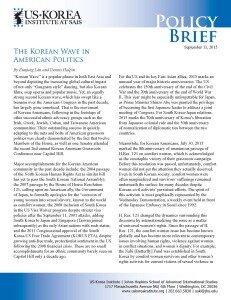 SAIS Lecturer Eunjung Lim and USKI Visiting Scholar Dennis Halpin review the accomplishments and analyze the rising influence of the Korean American community in US domestic politics.
SAIS Lecturer Eunjung Lim and USKI Visiting Scholar Dennis Halpin review the accomplishments and analyze the rising influence of the Korean American community in US domestic politics.
Download the USKI Policy Brief: “The Korean Wave in American Politics,” by Eunjung Lim and Dennis P. Halpin.
A shorter version of this brief was originally published as on op-ed in the Korea Times on September 8, 2015. Read it here.
Dr. Eunjung Lim is currently a lecturer for Korea Studies at School of Advanced International Studies at Johns Hopkins University. Her research interests include comparative studies on democracy and local politics. She has been researching on Korean Americans’ grassroots movement as well.
Dennis P. Halpin, a former US consul in Busan and Asian affairs advisor to the House Foreign Affairs Committee, is a visiting scholar at the US-Korea Institute and an adviser to the Poblete Analysis Group.
Published on December 4, 2013
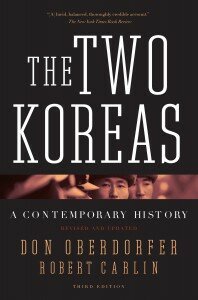 The US-Korea Institute at SAIS invites you to join us for the DC book launch for the revised edition of The Two Koreas: A Contemporary History. Korea uber-analyst and author Robert Carlin discusses the re-release of what many consider the foremost book on modern Korea, Don Oberdorfer’s The Two Koreas. Carlin wrote the updated foreward, bringing this arresting publication, loved by university students, business leaders and public alike, to a new generation of readers. Carlin will discuss the changes on the Korean Peninsula since the publication’s initial release, the publication’s continued relevance, and his labor of love saluting Van Fleet awardee and famed journalist Obderdorfer.
The US-Korea Institute at SAIS invites you to join us for the DC book launch for the revised edition of The Two Koreas: A Contemporary History. Korea uber-analyst and author Robert Carlin discusses the re-release of what many consider the foremost book on modern Korea, Don Oberdorfer’s The Two Koreas. Carlin wrote the updated foreward, bringing this arresting publication, loved by university students, business leaders and public alike, to a new generation of readers. Carlin will discuss the changes on the Korean Peninsula since the publication’s initial release, the publication’s continued relevance, and his labor of love saluting Van Fleet awardee and famed journalist Obderdorfer.
Book signing and reception to follow discussion. Copies of the book will be available for purchase from Politics & Prose. This event is free and open to the public.
Thursday, December 12, 2013
6:00 – 7:30 pm
Bernstein-Offit Building, Room 500
1717 Massachusetts Ave, NW
Washington, DC
PLEASE RSVP HERE.
Published on December 12, 2013
Published on September 11, 2013
Utter the words “Taft-Katsura” to an average American and the response will undoubtedly be a blank stare. But I learned from my years of teaching in Korea that the words “Taft-Katsura” will almost invariably invoke a long discourse from Korean professors and students on America’s betrayal of Korea in exchange for Japanese recognition of U.S. interests in the Philippines. “Taft-Katsura” is engraved in many minds as a key element in the victimization of Korea at the beginning of the twentieth century. ~ Dennis P. Halpin
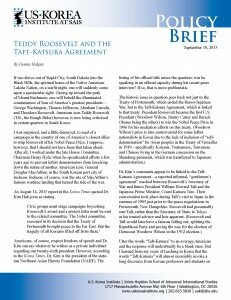
On August 14, 2013, an article from the Korea Times quoted Dr. Kim Hak-joon, president of the Northeast Asian History Foundation (NAHF), who suggested former President Theodore Roosevelt be stripped of his 1906 Nobel Peace Prize.
Dennis P. Halpin, former House Foreign Relations Committee staff member and current Visiting Scholar at the U.S.-Korea Institute at SAIS, examines the history of the Taft-Katsura Agreement in defense of Roosevelt’s legacy.
Download USKI Policy Brief “Teddy Roosevelt and the Taft-Katsura Agreement,” by Dennis P. Halpin.
Dennis P. Halpin is currently a visiting scholar at the U.S.-Korea Institute at Johns Hopkins School of Advanced International Studies (SAIS). He served as a Peace Corps volunteer in South Korea, U.S. consul in Pusan, and a House Foreign Affairs Committee staff member for over twelve years.
Published on August 15, 2013
“An August 1, 2013 editorial in the Yomiuri Shimbun, Japan’s largest circulation daily, carried the title “Comfort Women Allegations Distort Japanese History.” The greatest distortion here is the amnesia of an influential portion of Japanese society in addressing World War II history.” ~ Dennis P. Halpin
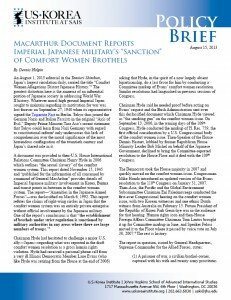 The Yomiuri Shimbun recently published a controversial editorial that challenged the characterization of comfort women as “sex slaves,” and suggested that such labels were historically inaccurate. It noted that the Japanese government could not find official documents proving that the women were recruited by force.
The Yomiuri Shimbun recently published a controversial editorial that challenged the characterization of comfort women as “sex slaves,” and suggested that such labels were historically inaccurate. It noted that the Japanese government could not find official documents proving that the women were recruited by force.
Dennis P. Halpin, former House Foreign Relations Committee staff member and current Visiting Scholar at the US-Korea Institute at SAIS, examines the 1945 report, “Amenities in the Japanese Armed Forces,” published by command of General MacArthur (declassified in 1992) and compiled by the Allied Translator and Interpreter Section (ATIS) of the Supreme Commander for the Allied Forces (SCAP), which refutes the Japanese government’s claims.
Download USKI Policy Brief “MacArthur Document Reports Imperial Japanese Military’s “Sanction” of Comfort Women Brothels,” by Dennis P. Halpin.
read more …
Published on May 7, 2011
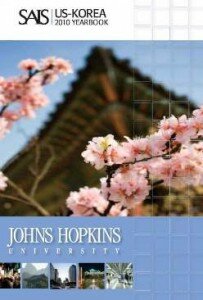 The U.S.-Korea Institute at SAIS is pleased to announce the release of the 2010 Edition of the SAIS U.S.-Korea Yearbook.
The U.S.-Korea Institute at SAIS is pleased to announce the release of the 2010 Edition of the SAIS U.S.-Korea Yearbook.
The Yearbook analyzes important developments in North and South Korea that characterized their relations in 2010. Each paper was written by a SAIS student from the course, “The Two Koreas: Contemporary Research and Record,” in the fall of 2010. Their insights were based on extensive reading and study as well as on numerous interviews conducted with government officials, scholars, NGO workers, academics and private sector experts both in Washington and Seoul.
Explore the 2010 SAIS U.S.-Korea Yearbook.
Published on May 4, 2011
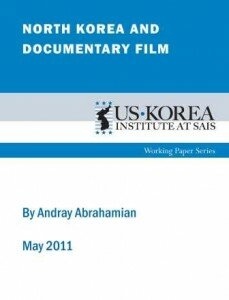 Documentary film is a potent source of knowledge production, carrying assumptions of authority and sobriety. It offers the audience “reality,” even as it mediates heavily and imposes discursive judgments onto the subject matter. This subjectivity is especially problematic in documentary films about North Korea, as Western filmmakers find it difficult to escape wartime racism, anticommunist, and Orientalist frameworks, while at the same time the DPRK resists knowledge production about itself.
Documentary film is a potent source of knowledge production, carrying assumptions of authority and sobriety. It offers the audience “reality,” even as it mediates heavily and imposes discursive judgments onto the subject matter. This subjectivity is especially problematic in documentary films about North Korea, as Western filmmakers find it difficult to escape wartime racism, anticommunist, and Orientalist frameworks, while at the same time the DPRK resists knowledge production about itself.
This USKI Working Paper by Andray Abrahamian looks at four influential films–Welcome to North Korea, The Vice Guide to North Korea, A State of Mind, and North Korea: A Day in the Life–to examine how they cope with problems of subjectivity, bias, and representing reality. Download the paper here.
 SAIS Lecturer Eunjung Lim and USKI Visiting Scholar Dennis Halpin review the accomplishments and analyze the rising influence of the Korean American community in US domestic politics.
SAIS Lecturer Eunjung Lim and USKI Visiting Scholar Dennis Halpin review the accomplishments and analyze the rising influence of the Korean American community in US domestic politics.
 The US-Korea Institute at SAIS invites you to join us for the DC book launch for the revised edition of The Two Koreas: A Contemporary History. Korea uber-analyst and author Robert Carlin discusses the re-release of what many consider the foremost book on modern Korea, Don Oberdorfer’s The Two Koreas. Carlin wrote the updated foreward, bringing this arresting publication, loved by university students, business leaders and public alike, to a new generation of readers. Carlin will discuss the changes on the Korean Peninsula since the publication’s initial release, the publication’s continued relevance, and his labor of love saluting Van Fleet awardee and famed journalist Obderdorfer.
The US-Korea Institute at SAIS invites you to join us for the DC book launch for the revised edition of The Two Koreas: A Contemporary History. Korea uber-analyst and author Robert Carlin discusses the re-release of what many consider the foremost book on modern Korea, Don Oberdorfer’s The Two Koreas. Carlin wrote the updated foreward, bringing this arresting publication, loved by university students, business leaders and public alike, to a new generation of readers. Carlin will discuss the changes on the Korean Peninsula since the publication’s initial release, the publication’s continued relevance, and his labor of love saluting Van Fleet awardee and famed journalist Obderdorfer.



